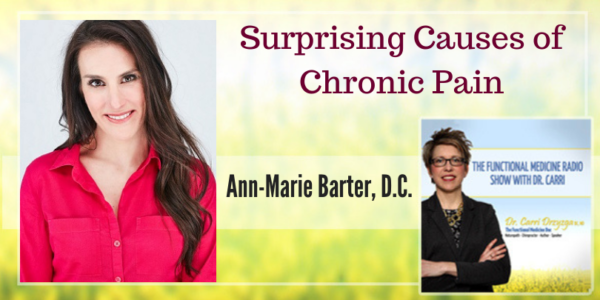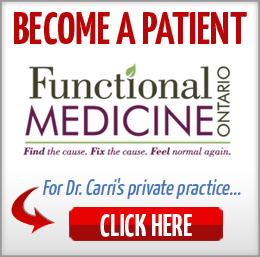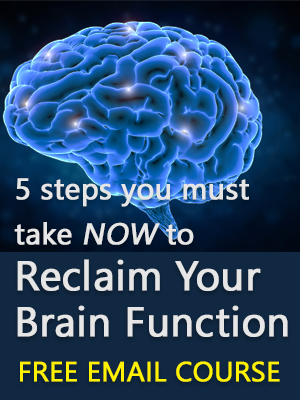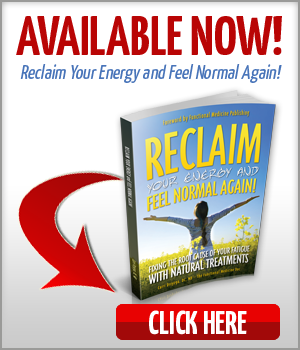Podcast: Play in new window | Download
Subscribe: Apple Podcasts | Android | RSS
In this episode of The Functional Medicine Radio Show, Dr. Carri’s special guest Dr. Ann-Marie Barter explains the links between functional medicine and some of the surprising causes of pain.
Dr. Ann-Marie Barter is on the cutting edge of holistic healthcare. As a chiropractor and functional medicine practitioner, she helps people get out of pain and reach their maximum potential through her unique approach she has developed after studying under some of the finest minds in her field.
She now specializes in difficult functional medicine cases, helping people with issues concerning their thyroid, blood sugar, gut health and hormone dysfunction as well as other metabolic conditions.
Main Questions Asked about Pain:
- What are some of the things we can think about as the root underlying causes of chronic pain?
- What about the thyroid?
- How can the gut microbiome impact people with pain?
- What else do you think about for patients with pain?
Key Points made by Dr. Barter about Pain:
- My first approach is lab work, but I also like to lay my hands on the patient just to see what is going on. If this indicates systemic inflammation, I look at their labs to see if there’s some kind of underlying infection.
- A lot of times chronic infections are low grade until a stressful event triggers them and, suddenly, you have this systemic chronic pain that won’t go away no matter what they try.
- I recently had a case with severe shoulder, neck and upper back pain that flared up when she was moving into a new home. In looking at the labs, it turned out she had autoimmune thyroid and ultimately had a chronic low grade viral infection, after we started treating the viral infection, suddenly all her pain cleared up.
- So you see those simple cases, just may not be. Because inflammation can present as pain, but doing structural work is not what we need to do to address the main cause.
- When we’re looking at reference ranges, it’s a standard deviation of the population – meaning that whoever had lab work done at that lab that year is compared. So if your population is sick or average, you’re put into that normal group, but that doesn’t mean that you don’t have symptoms.
- But 90% of the time, the CBC is completely ignored. These patients end up on anti-depressants, and pain medications that aren’t working. And, infections are a huge, huge cause of overall chronic pain.
- And vitamin D levels for most people are chronically low. And very low levels lead to an increased risk of autoimmune disease; and increased symptoms of fatigue, pain, anxiety, etc. Everyone presents differently with autoimmune disease
- We also see a lot of thyroid cases in my office, the big reason being that so many patients with autoimmune thyroids present with pain – they have depression, they have anxiety, they have just chronic headaches and chronic pain.
- Ultimately when you start to drill down in their particular labs, you see very high levels of inflammation and also that they have autoimmune thyroid; we’ve also made connections to some viral infections that seem to be high as well in any sort of Hashimoto’s case or autoimmune thyroid.
- Another issue is an under-conversion problem, primarily in the liver, wherein T4 is not being converted to the active T3 form of your thyroid hormones. So if TSH is the only thing that they’re checking, something is being missed.
- I also think about environmental exposures to chemicals; most of my patients are exposed to about 70,000 chemicals per day. When we look at the labs we see a little bit of functional fatty liver, so they’re not processing the toxins the way they should.
- If you have a low functioning thyroid, everything in the system slows down; every enzyme reaction is slower; you can even see the gallbladder contracting slower on ultrasound.
- So we actually have a detox issue; and one thing I’ve found very interesting is that most of these patients don’t sweat. I believe it’s really important to get somebody sweating, because one of their main detoxification pathways is not working.
- The gut microbiome is a big issue; it’s influenced by what we eat. Has our meat or dairy been exposed to antibiotics, have our grain products been exposed to pesticides? This affects our gut and creates a leaky gut syndrome.
- And when the foods we eat are going where they’re not supposed to go, we can have chronic problems every time we eat that food.
- I find that doing a very strict elimination diet for about a month and then slowly incorporating foods is effective. It’s an intuitive way to say “How do I feel when I eat this food?” and determine food sensitivities.
- I also find in my practice that many people are stressed out – they’re exhausted – they’re burning through neurotransmitters. And the microbiome influences how many and even, if we can make the neurotransmitters themselves.
- What I’ve found is that sometimes repopulating the neurotransmitters helps the patient stick to an elimination diet short-term, when they’ve been too overwhelmed at the idea. Lifestyle changes are pretty big and we want to set patients up for success.
- We also have a lot of pathogens in the gut, so a lot of times that has a potential to create pain or chronic pain.
- Another big one is dental infections. A lot of time you have sinus pain, referral headaches, and sometimes neck pain. Then there is exposure to mold, and, last but not least, some women have problems when their hormones are low.
- I don’t address the hormones first, because I find that if I can get the rest of the body back into alignment, then a lot of times the hormones will follow.
- One of the last points I really want to drive home is that this is a process. Pain is not something that needs to be totally blotted out. The question is why do you have pain, and it’s generally not due to one thing. When your body is saying “Cannot continue,” there tends to be more going on.
Resources Mentioned for Chronic Pain:
Dr. Barter’s website: https://altfammed.com/
Book – Reclaim Your Energy and Feel Normal Again
Thank you for listening! If you enjoyed this podcast, please subscribe and leave a 5 star rating and review on iTunes!




